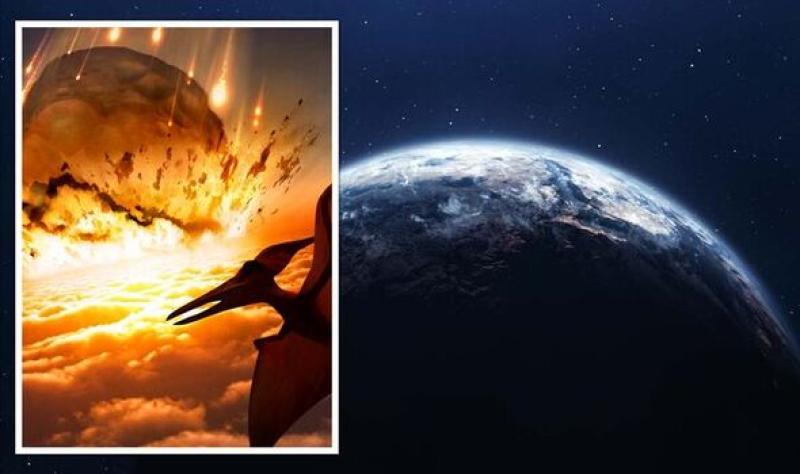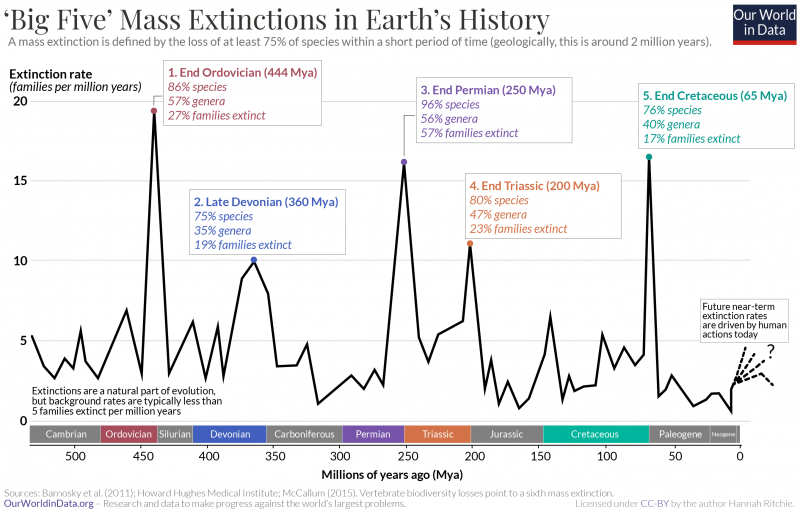There have been five mass extinctions in Earth's history
Category: Environment/Climate
Via: outis • last year • 11 commentsBy: Hannah Ritchie (Our World in Data)


When did the "Big Five" mass extinctions happen, and what were their causes?

I've seen several articles lately, indicating a shift in climate-skeptics' positions. They no longer really deny that climate change is happening - they simply do not intend to do anything to stop it... or even limit it.
They don't seem to understand the stakes. If we don't act, we're headed for a sixth mass extinction. The Earth will survive, of course. There will almost certainly be life on the planet. Equally certainly, homo sapiens will not survive.


Understanding the reasons and timelines of these events is important to understand the speed and scale of species extinctions today.
When and why did these mass extinction events happen?
What is a mass extinction?
First, we must be clear on what we mean by "mass extinction". Extinctions are a normal part of evolution: they occur naturally and periodically over time. 1
There's a natural background rate to the timing and frequency of extinctions: 10% of species are lost every million years, 30% every 10 million years, and 65% every 100 million years. 2 It would be wrong to assume that species going extinct is out of line with what we would expect. Evolution occurs through the balance of extinction - the end of species - and speciation - the creation of new ones.
Extinctions occur periodically at what we would call the "background rate". We can therefore identify periods of history when extinctions were happening much faster than this background rate - this would tell us that there was an additional environmental or ecological pressure creating more extinctions than we would expect.
However, mass extinctions are periods with much higher extinction rates than normal. They are defined by both magnitude and rate. Magnitude is the percentage of species that are lost. Rate is how quickly this happens. These metrics are inevitably linked, but we need both to qualify as a mass extinction.
In a mass extinction, at least 75% of species go extinct within a relatively (by geological standard) short period of time. 3 Typically less than two million years.
The five mass extinctions
There have been five mass extinction events in Earth's history, at least since 500 million years ago. We know very little about extinction events in the Precambrian and early Cambrian earlier, which predate this. 4 These are called the "Big Five" for obvious reasons.
In the chart, we see the timing of events in Earth's history. 5 It shows the changing extinction rate (measured as the number of families that went extinct per million years). Again, note that this number was never zero: background extinction rates were low - typically less than 5 families per million years - but ever-present.
We see the spikes in extinction rates marked as the five events:
- End Ordovician (444 million years ago; mya)
- Late Devonian (360 mya)
- End Permian (250 mya)
- End Triassic (200 mya) - many people mistake this as the event that killed off the dinosaurs. But in fact, they were killed off at the end of the Cretaceous period - the fifth of the "Big Five".
- End Cretaceous (65 mya) - the event that killed off the dinosaurs.
Finally, at the end of the timeline, we have the question of what will come. Perhaps we are headed for a sixth mass extinction. But we are currently far from that point.
There are a range of trajectories that the extinction rate could take in the decades and centuries to follow; which one we follow is determined by us.

What caused the five mass extinctions?
All of the "Big Five" were caused by some combination of rapid and dramatic changes in climate, combined with significant changes in the composition of environments on land or the ocean (such as ocean acidification or acid rain from intense volcanic activity).
In the table here, I detail the proposed causes for each of the five extinction events. 6
| Extinction Event | Age (mya) | Percentage of species lost | Cause of extinction |
| End Ordovician | 444 | 86% | Intense glacial and interglacial periods created large sea-level swings and moved shorelines dramatically. The tectonic uplift of the Appalachian mountains created lots of weathering, sequestration of CO2, and with it, changes in climate and ocean chemistry. |
| Late Devonian | 360 | 75% | Rapid growth and diversification of land plants generated rapid and severe global cooling. |
| End Permian | 250 | 96% | Intense volcanic activity in Siberia. This caused global warming. Elevated CO 2 and sulfur (H 2 S) levels from volcanoes caused ocean acidification, acid rain, and other changes in ocean and land chemistry. |
| End Triassic | 200 | 80% | Underwater volcanic activity in the Central Atlantic Magmatic Province (CAMP) caused global warming and a dramatic change in the chemical composition of the oceans. |
| End Cretaceous | 65 | 76% | Asteroid impact in Yucatan, Mexico. This caused a global cataclysm and rapid cooling. Some changes may have already pre-dated this asteroid, with intense volcanic activity and tectonic uplift. |




Not all life will disappear...
I've seen several articles lately, indicating a shift in climate-skeptics' positions. They no longer really deny that climate change is happening - they simply do not intend to do anything to stop it... or even limit it.
The inconvenient truth is we aren't the cause, it will happen anyways, and we can't stop it.
They don't seem to understand the stakes. If we don't act, we're headed for a sixth mass extinction. The Earth will survive, of course. There will almost certainly be life on the planet. Equally certainly, homo sapiens will not survive.
Quite a few out there believe they know what the stakes are and may take the wrong actions and cause a mass extinction when all that is happening is the coming of the next ice age and we have survived several ice ages already and with much less technology.
Thanks for the confirmation.
What do you think needs to happen for the next Ice Age to occur or when you think about the climate of an ice age what is your first thought?
I don't pretend to be a climate expert. Clearly, we're heading for a period of high temperatures. How high they'll go and how long they'll last is far outside my competence.
"Ice age" is a fantasy, for the moment.
Yep, that we are.
"Ice age" is a fantasy, for the moment.
I've seen this argument before, basically claiming that we are warming the earth to the point there will be no next "Ice Age", but a warming climate is what brings on the next ice age. The warm up has been happening ever since the cooling that ended the last ice age.
I know I'm right about this, because the sea levels were higher than they are now before each ice age and it takes heat to lift that much moisture into the atmosphere to build the ice sheets of an ice age to the depth of over a mile thick about 7 times now, that we know of, and in this time frame, approx. 800,000 years, the ice sheet of Antarctica has only grown to a depth of approx. 2-1/2 miles thick which means that the dynamics that build the Antarctic ice sheets, just plain cold, is not the dynamic that builds the ice sheets of an ice age.
It's a pity that none of the world's climatogists thought of this..'
I know, it is a pity. They have wrapped themselves so much into Milankovitch Cycles as to what causes ice ages that at this point, according to Milankovitch, we should be already in an ice age because the earth's northern hemisphere summers is when the earth is furthest away from the sun, but yet is still gets warmer, what gives. Oh its got to be those evil humans and their activity producing CO2 that must be overpowering the Milankovitch Cycles. Or maybe they should look at the Milankovitch Cycles, could it be just possible that Milankovitch was wrong. My position is he was wrong, when he heard the term that the earth went through ice ages he immediately made an assumption that the earth's climate had to be colder for an ice age to happen and as an ancient scientist, he did his work with faulty information of the time, but yet todays climatologists take his work as gospel, while also knowing that he didn't know that the sea levels were higher, than the are now, before an ice age starts, and it is a pity that none of them realize that it is the oceans and the excess warmer water in them that causes the ice ages.
I just this afternoon watched the movie Armageddon. Unfortunately Bruce Willis is no longer in condition to save us if something like that's going to really happen.
We'll have to save ourselves.
Good luck with that.